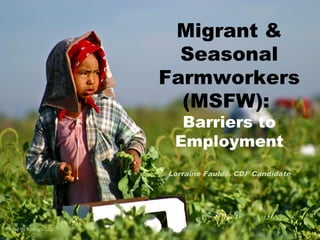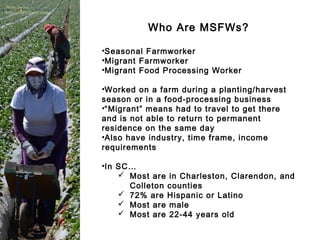Migrant and Seasonal Farmworkers
- 1. Migrant & Seasonal Farmworkers (MSFW): Barriers to Employment Lorraine Faulds, CDF Candidate Photo by Rodrigo Cruz
- 2. The stereotypical MSFW ŌĆóHere illegally ŌĆóCanŌĆÖt speak English ŌĆóHard workers ŌĆóSend most of their money home ŌĆóWill work for the lowest wages Photo by Gosia Wozniacka
- 3. Photo by Joe Klamar/AFP/Getty Images Who Are MSFWs? ŌĆóSeasonal Farmworker ŌĆóMigrant Farmworker ŌĆóMigrant Food Processing Worker ŌĆóWorked on a farm during a planting/harvest season or in a food-processing business ŌĆóŌĆ£MigrantŌĆØ means had to travel to get there and is not able to return to permanent residence on the same day ŌĆóAlso have industry, time frame, income requirements ŌĆóIn SCŌĆ” ’ā╝ Most are in Charleston, Clarendon, and Colleton counties ’ā╝ 72% are Hispanic or Latino ’ā╝ Most are male ’ā╝ Most are 22-44 years old
- 4. Barriers for MFSWs Language 74% of Latino adults in SC speak English ŌĆ£less than very wellŌĆØ--also called having Limited English Proficiency (LEP) Highest percentage in the Southeast region LEP affects healthcare, legal issues, employment, and education Photo by Scott Robinson
- 5. Barriers for MSFWs Education 41% of all Latinos in SC do NOT have a high school diploma or GED Of those MSFWs registered in SCWOS, only 11% have a high school diploma Over 34% have only a 6 th or 7 th grade education! Photo by Rainer Ehrhardt
- 6. Barriers for MSFWs Low Wages Most Hispanics in agriculture work in: ŌĆóAnimal Slaughtering/Processing ŌĆóLandscaping Services ŌĆóCrop Production Family income averaged between $15,000 and $17,499 per year (US). These are very low-paying jobs in SC: ŌĆóSlaughterers & Meatpackers $23,390 ŌĆóLandscaping Workers: $21,000 ŌĆóFarmworkers: $18,460 Without more education, this will continue. Photo by Bread for the World
- 7. A final thought: The childrenŌĆ” Photo from ŌĆ£The HarvestŌĆØ directed by Roberto Ramano ŌĆó300,000-400,000 children are employed as farmworkers (US) ŌĆóOften work 10 or more hours a day with sharp tools, heavy machinery, and dangerous pesticides ŌĆóDie at 4 times the rate of other working youth ŌĆóFarmworker children drop out of school in alarming numbers ŌĆóA short 8-minute video showing the life a child farmworker: http://latinalista.com/2013/11/viernes-videobone
Editor's Notes
- Undocumented workers make up about half of the nation's 1 million to 1.2 million farm-labor force (Daniel Gonz├Īlez, The Arizona Republic) In the United States last year, more than $120 billion was sent by workers to families abroad - making it the largest sender of remittances in the world. More than $23 billion went to Mexico, $13.45 billion to China, $10.84 billion to India and $10 billion to the Philippines, among other recipients. (www.dailymail.co.uk/news/article-2271455/Revealed-How-immigrants-America-sending-120-BILLION-struggling-families-home.html#ixzz2l6RvjC1O) Farm owners have trouble finding enough laborers: H-2A brings in non-immigrant foreign workers temporarily
- Construction is 4th Family income: According to the most recent National Agricultural Workers Survey ANYONE KNOW WHAT THE AVERAGE WAGE IN SC IS? WHAT ABOUT THE FEDERAL POVERTY THRESHOLD? Compare to SCŌĆÖs overall average wage of $38,700 And The Federal poverty rate of $23,550 RECAP: Not all stereotypes are trueŌĆ”but some are Barriers include language, education, and low income Children are suffering
- Legally, they can work at 12 yrs old Lack of affordable or available childcare forces many parents to bring children into the fields Farmworker children at 4 times as likely to dropout of school







